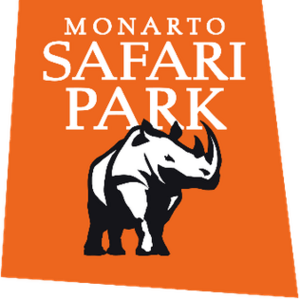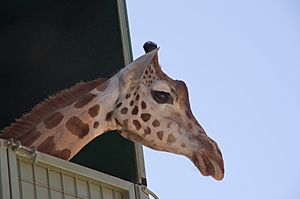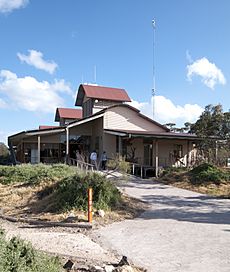Monarto Safari Park facts for kids
 |
|
| Date opened | 1983 |
|---|---|
| Location | Monarto, South Australia |
| Land area | 1,500 hectares (3,700 acres) |
| Coordinates | 35°06′08″S 139°08′33″E / 35.1021°S 139.1424°E |
Monarto Safari Park is a giant open-range zoo in South Australia. It was once known as Monarto Zoological Park or Monarto Zoo. This amazing park covers about 1500 hectares, which is like 3,700 football fields!
It's managed by the Royal Zoological Society of South Australia. You can find it in Monarto, about 70 kilometers from Adelaide's city center.
The park offers many cool experiences. You can get up close to lions and cheetahs. There are also interactive moments with meerkats and different types of rhinos. Plus, you'll see Australia's biggest group of giraffes!
Contents
Discovering Monarto Safari Park's History
Monarto Safari Park started in 1983. Back then, it was a special breeding area. It was closed to the public and focused on protecting endangered animals.
In 1990, people began to think about letting visitors in. By 1993, it became a big educational center. It opened its doors to the public, offering both bus and walking tours.
The park has five main habitat areas. These include areas designed to look like Asian steppes, arid North Africa, African plains, and Asian grasslands. A special fence surrounds the entire zoo. This fence keeps out unwanted animals, helping the habitats stay natural.
The park uses mostly native plants. This helps save water and stops the soil from washing away in this dry area. Roads and paths are made from local materials. This makes them easy to maintain and helps them blend into the environment. The park also recycles wastewater and uses solar power for its electric fences.
In late 2019, Monarto Zoo began a big project. It started changing into a safari park with fancy places to stay. By 2021, it officially became Monarto Safari Park. It is now the largest park of its kind outside of Africa!
About Monarto Safari Park
Monarto Safari Park is a huge open-range zoo. It covers 1500 hectares and is managed by the Royal Zoological Society of South Australia. The park is located near Monarto, South Australia.
Giraffe Breeding Success
Monarto Safari Park has been very successful at breeding giraffes. By 2015, it had one of the best giraffe breeding programs in Oceania. As of 2019, it has the most successful giraffe breeding programs in all of Australia!
Protecting Animals: Conservation Efforts
Monarto Safari Park works hard to protect endangered species. They have many breeding projects for animals. These include both Australian native species and exotic animals from other parts of the world.
Endangered Species Breeding Programs
The park helps many Australian animals. These include the greater bilby, the tammar wallaby, the yellow-footed rock-wallaby, and the eastern barred bandicoot.
They also help exotic species. Some of these are the scimitar oryx, Przewalski's horse, American bison, the addax, Barbary sheep, South African cheetah, southern white rhinoceros, black rhinoceros, and the African wild dog.
In 2006, the zoo started a special breeding program for Tasmanian devils. These devils are free of a serious facial tumor disease. This helps protect the species from this illness.
The warru (also called the black-footed rock-wallaby) is South Australia's most endangered mammal. Foxes and feral cats are a big threat to them. Monarto has had great success breeding these wallabies.
In 2007, 15 warru were brought to the park. Since then, they have helped create a healthy population of 22 wallabies. These live in a special fenced area called Pintji. In June 2017, 25 wallabies bred at Pintji were released into the wild. They are being watched, and efforts are made to control feral animals in their new home.
Ethical Products and Palm Oil
The shops and food places at Monarto Safari Park are careful about what they sell. They try to avoid products that contain palm oil. Palm oil production can harm animal habitats. The park encourages visitors to also avoid palm oil and provides information on how to do it.
 | May Edward Chinn |
 | Rebecca Cole |
 | Alexa Canady |
 | Dorothy Lavinia Brown |



